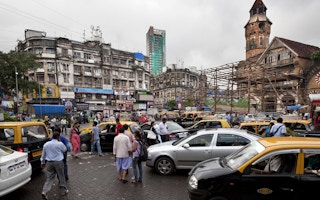Why is the transition to a sustainable economy going so painfully slowly? We have known the challenges for decades. We have the technology needed at hand. Financing has never been much cheaper than now. The sustainable business models have proven viable, and we have had dedicated top-level political focus on the issue (albeit on and off) since the first Earth Summit in Rio.
But still – all good initiatives unmentioned – things are moving at a glacial pace (as glaciers are supposed to move: slowly forwards, not as many do now) compared to the challenge.
I have been working with sustainability over the past twenty years, and to my experience at least part of the reason we are not moving faster are the hopeful anticipations for the “best” solution. That one technology or business models that will disrupt markets sustainably. Or that one political initiative that will open markets and investors’ wallets and effortlessly sweep us back to pre-industrial levels of pollution.
There are many examples of this: A globally enforced and fair carbon tax; a hydrogen-based energy system; using oceans as carbon sinks (turns out they are, and really suffering from it); biochar etc. What they have in common is perhaps the hope of reducing a very complex challenge to something more simple and actionable, but though many of these ideas can reference sound science and sometimes even a proven record, in my experience they often do the opposite and end up blocking progress on sustainability. A globally enforced and fair carbon tax is no doubt a great idea, but in reality, it is so unlikely to be enforced anytime soon that the main effect of focusing debates on it is that we overlook other and more achievable initiatives like cap and trade schemes or local low-carbon initiatives.
Over the last weeks, I have been traveling the world with the project Global Opportunity Network to conduct a series of workshops on five great sustainability challenges, namely: lock-in to fossil fuels, extreme weather, fresh water scarcity, the rise of non-communicable diseases, and unsustainable urbanisation.
Many insights came out of this. However, one was above them all: my distrust in the one size fits all ideas have been nurtured, but I’ve also become more confident that we have the ingenuity and energy to drive the transition, if we push aside the dreams of big fixes, and instead become wiser on the layout of the mosaic of perhaps lesser but still good solutions that can push us forward.
What Mumbai, Johannesburg and San Francisco want
“
A globally enforced and fair carbon tax is no doubt a great idea, but in reality, it is so unlikely to be enforced anytime soon that the main effect of focusing debates on it is that we overlook other and more achievable initiatives like cap and trade schemes or local low-carbon initiatives.
The realization came to me when I was finishing a workshop in Mumbai in early September. I was halfway through the series of eight workshops in a similar number of cities on five continents to look for locally relevant responses to the challenges of water scarcity, lock-in to fossil fuels, non-communicable diseases, extreme weather and urban breakdown.
In Mumbai, I was summing up the day, reflecting and commenting on the great work of a very enthusiastic crowd of business people, academics and NGO representatives, when I realized that they had very few perspectives in common with the group of similar people I had just met with in Johannesburg.
In South Africa, they looked to communities as the primary arena for creating change towards a more sustainable society. In India, answers to the pressing sustainability questions are not expected to come from local communities. Here they look to the government, international institutions, big business etc. for big-scale answers. In South Africa, the technologies of choice were the ones that empowered individuals and communities: mobile phones and distributed renewable energy. In India, technology was often seen as an enabler for better management. Big data was on the table a few times.
This experience was matched by the workshops across the Pacific Ocean in San Francisco and Sao Paulo. In the innovation hub of San Francisco, stakeholders highlighted technology that allowed personal choices especially when combined with smartphones – perhaps the recent success of the intelligent thermostat Nest is still in mind there. In Sao Paulo, Brazil’s decades long experiences with biofuels left a mark, but so did proper pricing schemes on both water and energy.
The question is of course, where does this leave us?
Good solutions need strong alliances
An attempt to embrace all the input in ‘one-size–fits-all’ recommendations of best solutions seems ridiculous. However there are distinct avenues of action that are perhaps not all globally relevant but at least deserve a place in the mosaic of responses to the global sustainability challenges that we see coming from the workshops. This is what we call opportunities.
As I see it, the best responses to the global sustainability challenges are not necessarily the ones that can boast the best result in a cost-benefit or an life cycle analysis. It is rather the ones – taken from the pool of good responses we have available – that make most sense for a broad group of stakeholders in the setting, where they are to be deployed. And these are most likely not the same across Johannesburg, San Francisco and Mumbai. To put it differently, the best solutions are the ones that we can build strong alliances behind, and many of these will be local and regional.
The outcome of the Global Opportunity Network workshops showed a mosaic of perspectives, which we as sustainability professionals now can start to learn how to navigate. There is not much novelty in pointing to regional, cultural or societal differences as a barrier to knowledge exchange. Therefore, the next step with the retrieved knowledge will be to provide professionals around the world with insights to how the mosaic of regionally preferred opportunities looks. In November we will conduct a survey that points to which of the opportunities identified creates the greatest resonance with business stakeholders. The result will show not only what might be good for society, but what business is ready to embrace.
Morten Jastrup is project director at the Denmark-based Global Opportunity Network, a collaboration between DNV GL and the Monday Morning Global Institute. The partners wish to present the first Global Opportunity Report in January 2015.


















